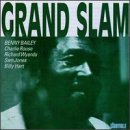| All Artists: Benny Bailey Title: Grand Slam Members Wishing: 0 Total Copies: 0 Label: Storyville Records Original Release Date: 11/3/1998 Release Date: 11/3/1998 Genres: Jazz, Pop Style: Bebop Number of Discs: 1 SwapaCD Credits: 1 UPCs: 090204024469, 717101827121 |
Search - Benny Bailey :: Grand Slam
 | Benny Bailey Grand Slam Genres: Jazz, Pop
|
Larger Image |
CD Details |
CD ReviewsProgressive hard bop quintet date from 1978 J. Levinson | Media, PA USA | 03/12/2003 (5 out of 5 stars) "Trumpeter Benny Bailey was teamed with veteran tenor-saxophonist Charlie Rouse on this hard-blowing October 1978 quintet date. The fresh material (two songs by Fritz Pauer who arranged the date, a pair from Bailey and one by Pepper Adams) inspires the soloists to play near their peak. A fine rhythm section (pianist Richard Wyands, bassist Sam Jones and drummer Billy Hart) pushes the horns.The album opens with take 2 of Pepper Adams' "Reflectory", a relaxed mid-tempo bop number nicely arranged with complementary parts for the two horns that lock together in powerful unison at the end of the melody statement. Sam Jones takes a nice melodic bass solo on this track.The cleverly titled "Who's Bossa Now" continues at about the same tempo with a pleasant bounce and some nice trumpet soloing by Bailey."Let Me Go" is a more aggressive bop number, though still at a measured pace. Propelled by Billy Hart's driving rhythm, Rouse and Wyands both take flowing solos, before Billy adjusts to a more sparse basic pattern to accompany another eloquent Sam Jones solo, which leads back to the melody statement, followed by a free jazz fade for the coda."Judgement of a Certain Kind", the longest track at over 12 minutes, has free jazz elements in its primary structure, encouraging more adventurous harmonic content in the horn, piano and bass solos throughout. This is the most progressive track, with the horns soloing expressively, then dropping out to piano, then dropping to Sam Jones exploratory bass, which then gives way to a dynamic drum solo, before the bass, then piano, then horns re-enter to reverse the process and close out with a seemingly random but perfect tenor squawk. Bailey's "Theloniousassault" is back to more conservative hard bop, though, with the angular approach of it's namesake, it's still well on the progressive side of mainstream. No tenor is more qualified than Rouse to expand on the vision of Monk. The CD concludes with bookend alternate takes of "Let Me Go", and, finally, with "Reflectory", the opening number, achieves the highest goal of true art, returning you to where you started, but with a greatly enhanced perspective."
|

 Track Listings (7) - Disc #1
Track Listings (7) - Disc #1